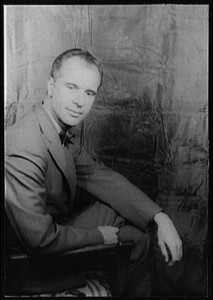
Hersey wrote an aftermath to "Hiroshima" 40 years later, tracing the fates of the six survivors he originally interviewed. (Photo by Carl Van Vechten.)
Truman Capote’s In Cold Blood and John Hersey’s Hiroshima are the two best pieces of long-form American nonfiction I have ever read. I wouldn’t change a word of either one. Hersey’s work, which he wrote for his longtime employer, The New Yorker, was so brilliantly shattering that the entire August 31, 1946 issue was dedicated solely to the article. It became an instant classic and so did the subsequent book version.
Although he was always best know for this piece during his life, Hersey turned out a formidable quantity of other quality fiction and nonfiction. A 1989 Vintage collection, Life Sketches: Incisive and Profoundly Insightful Portraits of Extraordinary Men and Women, 1944-1989, brought together some of Hersey’s finest biographical articles.
The 1945 piece, “The Brilliant Jughead,” tells the story of Private John Daniel Ramey, an illiterate U.S. soldier who was sent to a special training unit in Pennsylvania that conducted a highly successful three-month basic literacy course. This unit, and others like it, taught more than a quarter million illiterate servicemen–who were labeled with the pejorative “jughead” by some fellow soldiers–to read and write during WWII. An excerpt:
“Private Ramey, who was assigned to the Pennsylvania school toward the end of March, 1945, could hardly be called a typical jughead. There is, in fact, no typical illiterate, any more than there is a typical college graduate. Ramey is above whatever average there is. He finished the course, which usually takes twelve weeks, in ten. By jughead standards, Ramey is brilliant. He says that he was often embarrassed, when he was a civilian, by not being able to read and write, but the surprising thing about his life before the war is how much he, an illiterate, was able to do for himself: at one time he owned a house, ran a small coal mine employing twenty-eight men, and had two automobiles, the better of which was a Mercury with, as he says, ‘one of them cloth tops on it,’ bought brand-new. The fact that he is above average makes him especially grateful for the opportunities, the amazements, opened up for him by being educated, for the first time in his life, to the written word.”
